Porsche Automobil Holding Bundle
Who Really Owns Porsche?
Unraveling the ownership structure of Porsche Automobil Holding SE is key to understanding the dynamics of the automotive industry. This German multinational corporation, born from the vision of Ferdinand Porsche, holds a significant stake in the Volkswagen Group, influencing the future of iconic brands. Discover the intricate web of stakeholders and the evolution of Porsche Automobil Holding SWOT Analysis.
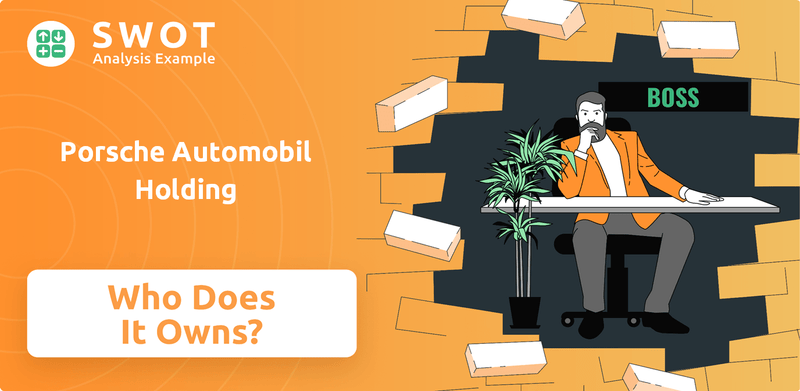
From its inception, the Porsche family has played a crucial role in shaping the company's destiny, but the story of Porsche ownership is far more complex than a simple family affair. The Volkswagen Group's influence and the role of public shareholders have created a fascinating interplay of power. Understanding the history of Porsche ownership, including its relationship with Volkswagen, is essential for anyone seeking to navigate the automotive industry's intricacies and understand the financial performance of Porsche Holding.
Who Founded Porsche Automobil Holding?
The story of Porsche Automobil Holding SE begins with its founders, Ferdinand Porsche and Anton Piëch. In 1931, they established 'Dr. Ing. h.c. F. Porsche GmbH' in Stuttgart, laying the foundation for what would become a global automotive powerhouse. Initially focused on design and consulting, the company's early work included the development of the Volkswagen Beetle, a project of immense historical significance.
The early ownership structure of the company was primarily within the Porsche and Piëch families. While the exact initial equity split is not publicly available, it's known that the company operated as a Kommanditgesellschaft (limited partnership) under family control until 1972. This structure allowed the Porsche family to maintain direct management and control during the formative years.
The evolution of Porsche's ownership structure reflects the company's growth and adaptation to the demands of the automotive industry. This transformation was a pivotal moment in the company's history, setting the stage for its future development and its relationship with the Volkswagen Group.
Ferdinand Porsche and Anton Piëch founded 'Dr. Ing. h.c. F. Porsche GmbH' in 1931 in Stuttgart.
The company initially concentrated on motor vehicle development and consulting.
One of the earliest projects was the design of the Volkswagen Beetle.
The company was run by the Porsche family as a Kommanditgesellschaft until 1972.
In 1972, Ferry Porsche transformed the company into an Aktiengesellschaft (AG).
The Porsche and Piëch families maintained influence through the supervisory board.
The restructuring in 1972 marked a significant shift in the operational control, moving it away from direct family management while the family maintained oversight through the supervisory board. This transition was crucial for the company's growth, allowing it to adapt to the complexities of the automotive industry. The intertwined history of the Porsche and Piëch families, stemming from the marriage of Ferdinand Porsche's daughter Louise Porsche to Anton Piëch in 1928, solidified their collective influence over the company from its inception. As of late 2024, the Volkswagen Group, which Porsche Holding has a close relationship with, holds a significant stake in Porsche AG, reflecting the ongoing evolution of
Porsche Automobil Holding SWOT Analysis
- Complete SWOT Breakdown
- Fully Customizable
- Editable in Excel & Word
- Professional Formatting
- Investor-Ready Format
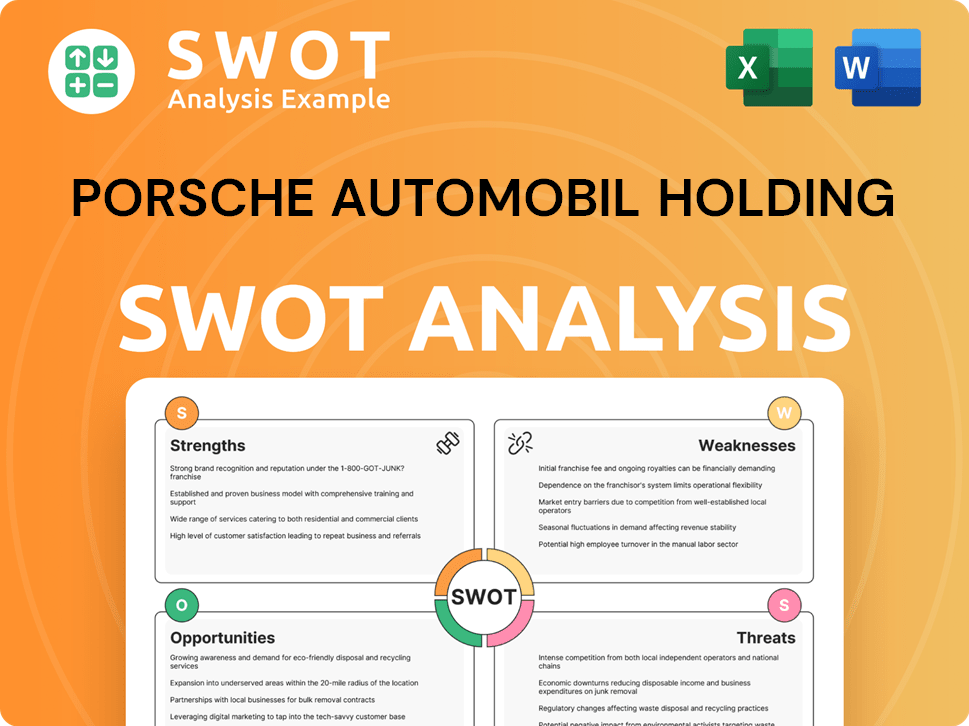
How Has Porsche Automobil Holding’s Ownership Changed Over Time?
The evolution of Porsche Automobil Holding SE's ownership is closely tied to its relationship with the Volkswagen Group. Initially, Porsche SE, formerly Dr. Ing. h.c. F. Porsche AG, was established in June 2007 as a holding company for the Porsche and Piëch families' stakes. A pivotal shift occurred between 2008 and 2009 when Porsche SE significantly increased its holdings in Volkswagen AG, aiming for a controlling interest. This ambition led to complex restructuring, culminating in Volkswagen AG acquiring the automotive manufacturing business of Porsche AG.
The transition involved Porsche SE increasing its stake in Volkswagen AG, reaching 35.14% by September 16, 2008, and then 50.76% by January 7, 2009. The original plan was to increase the stake to 75% in 2009. However, due to financial challenges, a deal was reached in August 2009, where Volkswagen AG gradually took over Porsche AG's automotive manufacturing operations. By August 1, 2012, Volkswagen AG had completed the full acquisition of Porsche AG. This restructuring reshaped the ownership dynamics, setting the stage for the current structure.
| Key Event | Date | Impact |
|---|---|---|
| Porsche SE Established | June 2007 | Transitioned 'old' Dr. Ing. h.c. F. Porsche AG into a holding company. |
| Increased Stake in Volkswagen AG | September 16, 2008 - January 7, 2009 | Porsche SE aimed for controlling interest in Volkswagen AG. |
| Restructuring Agreement | August 2009 | Volkswagen AG began acquiring Porsche AG's automotive business. |
| Volkswagen AG Full Ownership | August 1, 2012 | Volkswagen AG completed the full acquisition of Porsche AG. |
Currently, Porsche Automobil Holding SE's primary investment is a controlling stake in Volkswagen AG. As of December 31, 2024, Porsche Automobil Holding SE holds 53.3% of the voting rights and 31.9% of the subscribed capital in Volkswagen AG, making it the single largest shareholder. The Porsche-Piëch family, through their ownership of all ordinary shares in Porsche SE, maintains 100% of the voting rights, ensuring their significant influence over both Porsche SE and Volkswagen AG. This structure highlights the enduring influence of the Porsche family within the automotive industry and the Porsche ownership structure.
The Porsche Holding structure is complex, with the Porsche-Piëch family holding significant influence.
- Porsche SE controls Volkswagen AG with 53.3% of voting rights.
- Volkswagen AG indirectly holds a significant portion of Porsche AG.
- The Porsche family maintains control through 100% of the voting rights in Porsche SE.
- The State of Lower Saxony and Qatar Holding LLC are also major shareholders in Volkswagen AG.
Porsche Automobil Holding PESTLE Analysis
- Covers All 6 PESTLE Categories
- No Research Needed – Save Hours of Work
- Built by Experts, Trusted by Consultants
- Instant Download, Ready to Use
- 100% Editable, Fully Customizable
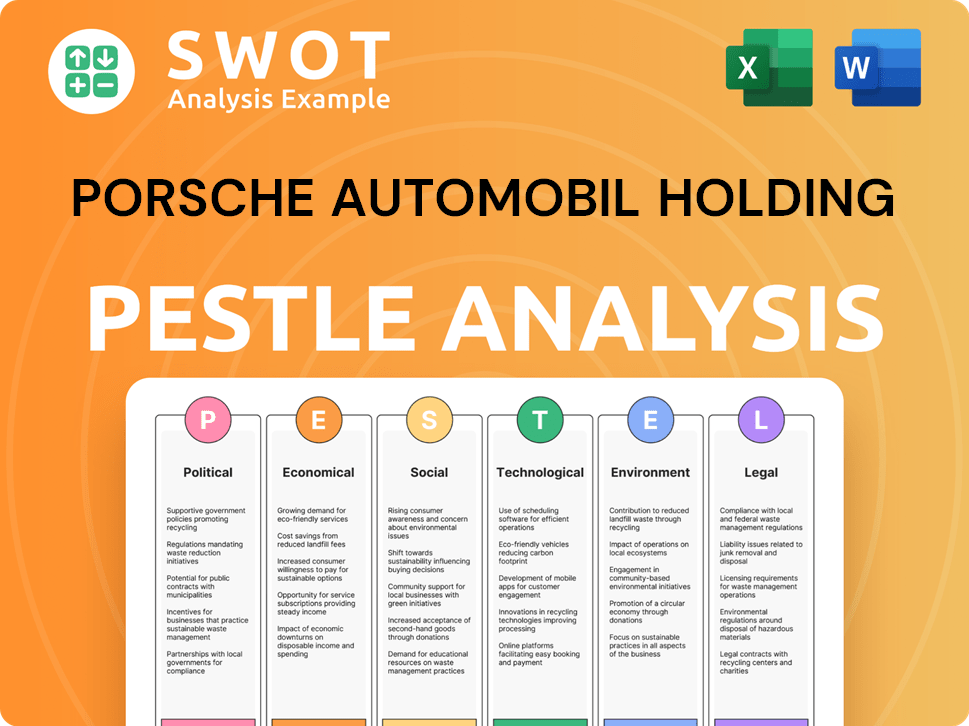
Who Sits on Porsche Automobil Holding’s Board?
The current board of directors of Porsche Automobil Holding SE, as of 2024, is deeply rooted in the Porsche-Piëch family, which ensures strong control over the company's strategic direction. Key figures on the supervisory board include Wolfgang Porsche as Chairman, alongside Hans Michel Piëch, Ferdinand Oliver Porsche, Hans-Peter Porsche, Josef Michael Ahorner, and Stefan Piëch. This composition reflects the family's commitment to maintaining influence within the automotive industry.
This family-centric structure is critical to understanding Porsche ownership and the company's relationship with the Volkswagen Group. The board's composition reinforces the family's long-term vision, ensuring alignment between decisions and the interests of the founding families. Understanding the Porsche Holding company structure is key to grasping the dynamics of the automotive industry.
| Board Member | Role | Family Affiliation |
|---|---|---|
| Wolfgang Porsche | Chairman | Porsche |
| Hans Michel Piëch | Member | Piëch |
| Ferdinand Oliver Porsche | Member | Porsche |
| Hans-Peter Porsche | Member | Porsche |
| Josef Michael Ahorner | Member | N/A |
| Stefan Piëch | Member | Piëch |
The voting power within Porsche Automobil Holding SE is concentrated within the Porsche and Piëch families. They collectively hold 100% of the voting rights through their ownership of all ordinary shares. This structure grants the founding families significant control, even though preferred shares are publicly traded and do not carry voting rights. This arrangement is crucial for maintaining the family's influence over the company's strategic decisions and its investment in the Volkswagen Group. For more insights, consider reading a Brief History of Porsche Automobil Holding.
The Porsche-Piëch family controls Porsche SE through 100% ownership of voting shares.
- The board of directors is primarily composed of family members.
- Preferred shares are publicly traded but have no voting rights.
- This structure protects against activist investor campaigns.
- The family's influence ensures decisions align with their long-term vision.
Porsche Automobil Holding Business Model Canvas
- Complete 9-Block Business Model Canvas
- Effortlessly Communicate Your Business Strategy
- Investor-Ready BMC Format
- 100% Editable and Customizable
- Clear and Structured Layout
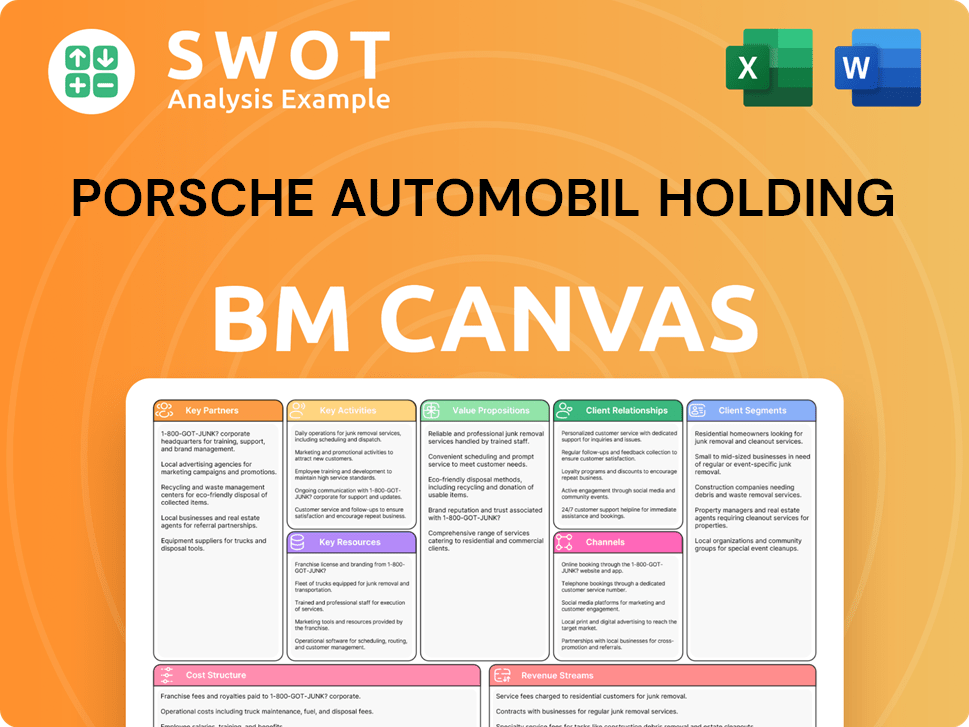
What Recent Changes Have Shaped Porsche Automobil Holding’s Ownership Landscape?
Recent developments in Porsche ownership showcase a strategic focus on core investments. Porsche Automobil Holding SE (Porsche SE) has a significant stake in Volkswagen AG and Porsche AG. As of December 31, 2024, Porsche SE held a 53.3% stake in the ordinary shares of Volkswagen AG, representing 31.9% of the subscribed capital. Additionally, Porsche SE owns 25% plus one ordinary share of Porsche AG, equivalent to 12.5% of the subscribed capital.
The initial public offering (IPO) of Porsche AG in September 2022 was a pivotal event. This IPO, which was Europe's largest by market capitalization at the time, allowed public ownership of Porsche AG's non-voting preference shares. Volkswagen AG retained 75% of the ordinary shares, while Porsche SE acquired 25% plus one ordinary share. This strategic move solidified Porsche SE's and the Porsche family's direct control over the Porsche brand. For a broader perspective on the competitive environment, consider exploring the Competitors Landscape of Porsche Automobil Holding.
| Financial Year | Group Result After Tax | Net Debt |
|---|---|---|
| 2023 | €5.1 billion | |
| 2024 (Expected) | Approx. minus €20.0 billion (Adjusted: €3.2 billion) | Approx. €5.2 billion |
| 2025 (Forecast) | Between €2.4 billion and €4.4 billion | Between €4.9 billion and €5.4 billion (by December 31, 2025) |
Ownership trends highlight the importance of institutional investors. Over half of Porsche SE's preferred shares are held by institutional investors, mainly outside Germany. The remaining free float is largely held by private investors in Germany. Furthermore, Porsche SE diversifies its portfolio with minority shareholdings in technology companies across North America, Europe, and Israel, along with investments in private equity and venture capital funds. The company's strategy aims to create shareholder value through asset appreciation and dividend distributions. For fiscal year 2024, a dividend of €1.910 per preferred share and €1.904 per ordinary share was proposed.
The Porsche family, through Porsche SE, has significant influence. The company's structure ensures the family's long-term strategic control. Volkswagen AG is a key investment, but the family maintains substantial decision-making power.
Volkswagen AG holds a significant stake in Porsche AG. This relationship is crucial for the Volkswagen Group's overall strategy. The IPO of Porsche AG in 2022 changed the ownership structure.
Porsche SE is the holding company, with investments in Volkswagen AG and Porsche AG. This structure allows for strategic oversight and investment in the automotive industry. The company also diversifies its investments.
Financial performance includes results from investments in Volkswagen AG and Porsche AG. The company's financial results are heavily influenced by its core holdings. The company's net debt is carefully managed.
Porsche Automobil Holding Porter's Five Forces Analysis
- Covers All 5 Competitive Forces in Detail
- Structured for Consultants, Students, and Founders
- 100% Editable in Microsoft Word & Excel
- Instant Digital Download – Use Immediately
- Compatible with Mac & PC – Fully Unlocked
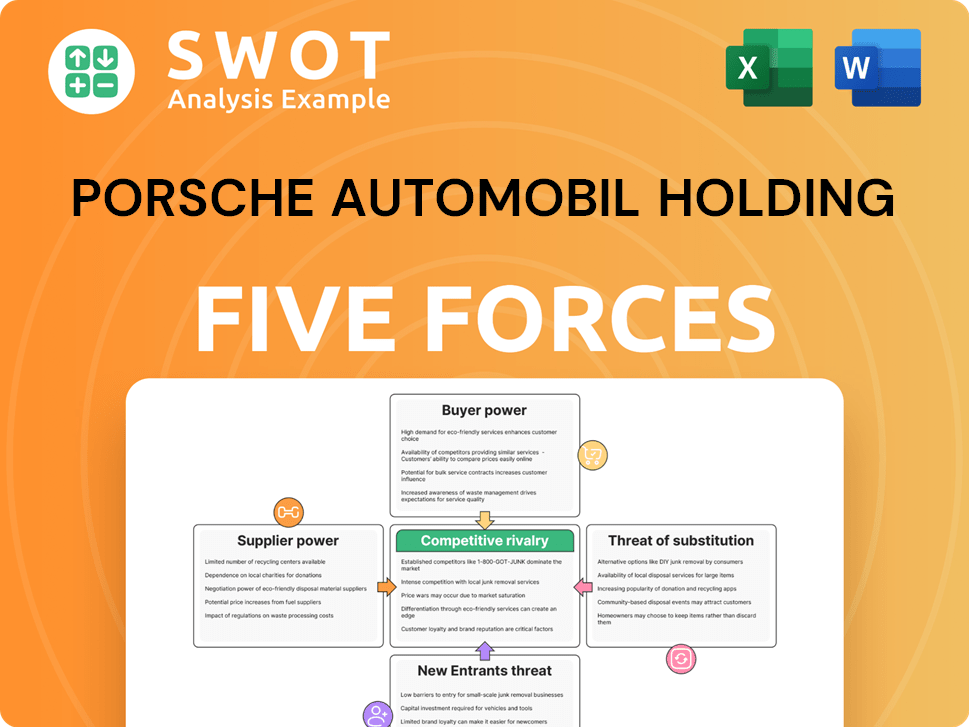
Related Blogs
- What are Mission Vision & Core Values of Porsche Automobil Holding Company?
- What is Competitive Landscape of Porsche Automobil Holding Company?
- What is Growth Strategy and Future Prospects of Porsche Automobil Holding Company?
- How Does Porsche Automobil Holding Company Work?
- What is Sales and Marketing Strategy of Porsche Automobil Holding Company?
- What is Brief History of Porsche Automobil Holding Company?
- What is Customer Demographics and Target Market of Porsche Automobil Holding Company?
Disclaimer
All information, articles, and product details provided on this website are for general informational and educational purposes only. We do not claim any ownership over, nor do we intend to infringe upon, any trademarks, copyrights, logos, brand names, or other intellectual property mentioned or depicted on this site. Such intellectual property remains the property of its respective owners, and any references here are made solely for identification or informational purposes, without implying any affiliation, endorsement, or partnership.
We make no representations or warranties, express or implied, regarding the accuracy, completeness, or suitability of any content or products presented. Nothing on this website should be construed as legal, tax, investment, financial, medical, or other professional advice. In addition, no part of this site—including articles or product references—constitutes a solicitation, recommendation, endorsement, advertisement, or offer to buy or sell any securities, franchises, or other financial instruments, particularly in jurisdictions where such activity would be unlawful.
All content is of a general nature and may not address the specific circumstances of any individual or entity. It is not a substitute for professional advice or services. Any actions you take based on the information provided here are strictly at your own risk. You accept full responsibility for any decisions or outcomes arising from your use of this website and agree to release us from any liability in connection with your use of, or reliance upon, the content or products found herein.